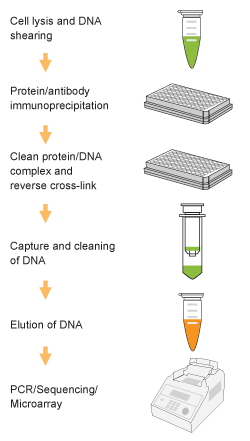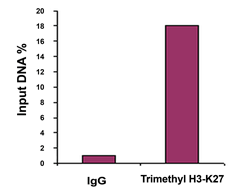EpiQuik Chromatin Immunoprecipitation Kit for Plants
For immunoprecipitating chromatin specifically from plant input samples
Product Description
The EpiQuik™ Plant ChIP Kit is a convenient package of tools that allows the experimenter to investigate protein-DNA interaction in vivo efficiently. The entire procedure can be completed within 6 hours and produces far superior results than any competitor kits. The EpiQuik™ Plant ChIP Kit is suitable for combining the specificity of immunoprecipitation with qualitative and quantitative PCR, ChIP-Seq, and ChIP-on-chip. This kit has the following advantages:
- The fastest procedure available, which can be finished within 6 hours.
- Strip microwell format makes the assay flexible: manual or high throughput.
- Columns for DNA purification are included: save time and reduce labor.
- Compatible with all DNA amplification-based approaches.
- Simple, reliable, and consistent assay conditions.
See also a quick chart to compare ChIP kits.
Background Information
Protein-DNA interaction play a critical role for cellular functions such as signal transduction, gene transcription, chromosome segregation, DNA replication and recombination, and epigenetic silencing. In plants, interactions between the DNA-binding proteins and cognate promoter sequences are primary determinants in establishing spatial and temporal expression patterns of genes that effect homeostasis, development, and adaptation. Chromatin Immunoprecipitation (ChIP) offers an advantageous tool for identifying direct genomewide associations between specific regulatory proteins and their target genes. Unlike other methods such as EMASA, DNA microarrays, and report gene assays, which analyze direct interactions between protein and DNA in vitro, ChIP can detect that a specific protein binds to the specific sequences of a gene in living cells.
Principle & Procedure

This ChIP kit includeds all reagents required for carrying out a successful chromatin immunoprecipitation from plant cells. Particularly, this kit includes a ChIP-grade dimethyl-histone H3-K9 antibody and a negative control normal mouse IgG. Chromatin from the cells is extracted, sheared, and added into the microwell immobilized with the antibody. DNA is released from the antibody-captured protein-DNA complex, reversed and purified through the specifically designed F-Spin Column. Eluted DNA can be used for various down-stream applications.
Starting Materials
Starting materials can include various plant tissue (flowers, leaves, young seedlings). In general, the input amount should be from 20 to 50 mg of plant tissue for each reaction.
Performance Data

Fig.2. DNA was immunoprecipitated from 2-week-old icu2-1/icu2-1 seedlings. PCR was used to amplify the ORNITHINE TRANSCARBAMILASE (OTC) gene and regions of the AGAMOUS gene.
Product Citations
- Chang M, Sun Y, Fang K, Fu M, Ma J, Gao Y, Chen Q, Liu L, Zhang Z, Wan X, Sun J (2024) CsMYB73 negatively regulates theanine accumulation mediated by CsGGT2 and CsGGT4 in tea shoots (Camellia sinensis). Hortic Res
- Du Y, Ma H, Liu Y, Gong R, Lan Y, Zhao J, Liu G, Lu Y, Wang S, Jia H, Li N, Zhang R, Wang J, Sun G (2024) Major quality regulation network of flavonoid synthesis governing the bioactivity of black wolfberry. New Phytol
- Jia D, Li Y, Jia K, Huang B, Dang Q, Wang H, Wang X, Li C, Zhang Y, Nie J, Yuan Y (2024) Abscisic acid activates transcription factor module MdABI5-MdMYBS1 during carotenoid-derived apple fruit coloration. Plant Physiol
- Kong X, Chen Y, Li H, Li M, Liu X, Xia L, Zhang S (2024) Dissociation of transcription factor MYB94 and histone deacetylases HDA907/908 alleviates oxidative damage in poplar. Plant Physiol
- Rong F, Lv Y, Deng P, Wu X, Zhang Y, Yue E, Shen Y, Muhammad S, Ni F, Bian H, Wei X, Zhou W, Hu P, Wu L (2024) Switching action modes of miR408-5p mediates auxin signaling in rice. Nat Commun
- Catalog Number
P-2014-24-EP - Supplier
EpigenTek - Size
- Shipping
Blue Ice

